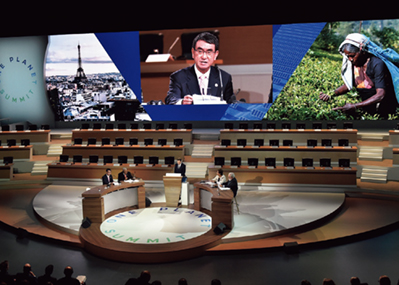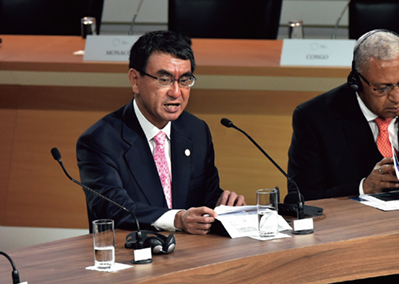Section 3 Climate Change Measures and SDGs
There is a tendency to regard climate change as an environmental issue, but it also has significant impact on economic development and security on a global scale. It is closely related to many targets set out under the SDGs, including stable supplies of water, energy and food. Hence, it would be extremely challenging to achieve the SDG targets in these related fields without the steady and quick implementation of climate change measures. The Paris Agreement was adopted as an international framework for climate change measures after 2020. To date, more than 170 countries have ratified the agreement, and set out their individual emissions reduction targets with the aim of limiting temperature rise to 1.5 degree Celsius, based on the goal of keeping the rise in global temperature below 2 degrees Celsius after the industrial revolution. Climate change actions are broadly categorized as: (i) “mitigation” measures aimed at reducing and absorbing greenhouse gas emissions (such as carbon dioxide), and (ii) “adaptation” measures that involve the use of new climate conditions as well as readiness in order to prevent and alleviate the adverse impact of climate change that is already occurring gradually. With regard to “adaptation” measures, the application of the SDGs Index, apart from the climate changes described at the beginning of this section, is also considered to be an effective means of evaluating initiatives and outcome of the initiatives.
To reach the 2-degree Celsius-target set out under the Paris Agreement, it is vital to have the active involvement not only of the governments of the countries involved, but also of various entities such as corporations, local governments, and NGOs. Many global corporations perceive the implementation of such actions as an excellent opportunity for expanding their businesses through the resolution of social issues, not considering such measures as an element that damages their international competitiveness due to the additional cost that is imposed on the company, Furthermore, the momentum for attracting even more “green” investments through the disclosure of the risks related to climate change in the company's financial information is now expanding across all regions of the world, coupled with the recent growth in ESG investments, which encourages investment that contributes to reforming and improving the environment, social issues and governance. This proactive approach by corporations and investors suggests that climate change is not just an environmental issue, but is increasingly becoming a business issue.
In view of such trends in the business circles, the One Planet Summit, a conference on climate change, was held in Paris in December 2017 to commemorate the second anniversary of the adoption of the Paris Agreement, as well as to reaffirm the importance of climate funding while encouraging public and private funds to “go green.” Foreign Minister Kono, who participated in this Summit as a panelist, expressed Japan's resolve to lead the world in applying the power of innovation, which harnesses its advanced technological prowess, to the scaling-up of climate financing. He also described the need to strengthen public-private partnerships in order to achieve that. As one of these initiatives, he declared the government's support for the registration of Japanese corporations with Science Based Targets (SBT), described as the corporate version of the 2 degree Celsius-target, and established the goal of having 100 Japanese companies certified under the program by March 2020.
With the aim of establishing a new direction for climate change policies, the Ministry of Foreign Affairs has also launched new initiatives that include the setting up of an “Advisory Panel of Experts on Climate Change,” and the introduction of a climate change specialist system at Japanese embassies abroad to work on the dissemination and collection of various information outside of Japan. The steady enforcement of the Paris Agreement through such initiatives within and outside Japan, as well as collaboration with corporations and other entities, is an issue of vital importance towards the achievement of the SDGs.

One Planet Summit held in Paris in December 2017

Foreign Minister Taro Kono speaking at the summit
